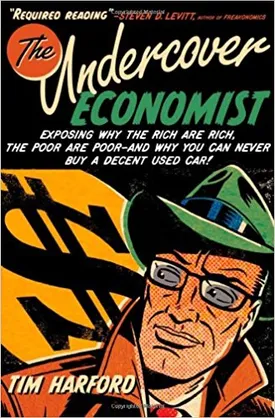The Undercover Economist: Exposing Why the Rich Are Rich, the Poor Are Poor – And Why You Can Never Buy a Decent Used Car! by Tim Harford
The Undercover Economist: Exposing Why the Rich Are Rich, the Poor Are Poor – And Why You Can Never Buy a Decent Used Car!, written by popular economics writer Timothy Harford, is a captivating read that explores how the world of economics works and how this affects the wealth of the rich and poor alike.
In this book, Harford draws from stories from around the world to offer insight into the economic forces that shape our collective realities. He examines topics as wide-ranging as globalisation, the impact of taxation, regulation, and monopoly power, how technology is changing economies, why inequality persists in countries around the world, and how our behaviour affects the markets we interact with.
The undercover economist is the title Harford has chosen to refer to himself, since he believes the true nature of economics lies in learning the facts and piecing together the motivations behind why people behave the way they do. He seeks to uncover the unseen forces at work, which is especially important as these forces often have greater influence over our lives than we realise.
Harford begins the book by introducing readers to several examples of how economics affects everyday decisions. He uses the example of used car purchasing to illustrate how economics affects pricing and decision-making, and how this can be used to one's advantage. He explains how prices of cars can vary even when other elements are not taken into account, and how the structure of the used car market is a prime example of how the use of economics can inform our decisions.
Much of the book is dedicated to examining the economic concepts of taxation and regulation, and how they differ from country to country. Harford delves into the reasons behind why taxes differ and how different ways of taxation can influence the way economies function. He further investigates the topic of government regulation and its effects on different economies. Finally, Harford examines how technology is transforming the economies of today and how this affects wages, as well as the implications of monopoly power and its impact on various markets.
The book also tackles the issue of inequality, discussing why it persists in certain areas and offering solutions for how society can help level the playing field. Through a series of discussions, Harford demonstrates how inequality can ruthlessly exclude certain sectors, and how change must come from society in the form of policy changes and regulations to address this issue.
The insights Harford provides in the book makes it an invaluable resource for those wishing to gain a better understanding of how economics works. And although the subject may be daunting, the humorous and anecdotal style of writing allows the book to remain accessible. This book is an invaluable read for those who wish to broaden their understanding of economics, and to understand why the rich are rich, the poor are poor – and why you can never buy a decent used car!

